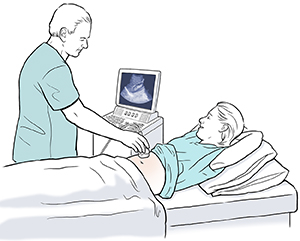A
B
C
D
E
F
G
H
I
J
K
L
M
N
O
P
Q
R
S
T
U
V
W
X
Y
Z
Topic IndexLibrary Index
Click a letter to see a list of conditions beginning with that letter.
Click 'Topic Index' to return to the index for the current topic.
Click 'Library Index' to return to the listing of all topics.
Abdominal Ultrasound
An abdominal ultrasound is an imaging test. It uses sound waves to form pictures of your abdominal organs. It can help find organ problems, such as gallstones, kidney stones, or liver disease. Ultrasound does not use ionizing radiation (like an X-ray does) and does not have any known risks. It can also see many blood vessels in the belly (abdomen). If needed as part of your exam, the blood flow in these blood vessels can also be checked.
Before your test
-
What you need to do to get ready for the test depends on the area of your body that will be looked at. Follow any directions you’re given for not eating or drinking before the procedure. Your healthcare provider will give you instructions if required.
-
Follow all other instructions given by your provider.
For best results, be ready to answer questions about your health history, including the following:
During your test
-
You may be asked to put on a gown.
-
You will lie on an exam table with your abdomen exposed.
-
A nongreasy gel will be put on your skin.
-
The sonographer (the person who does the test) will use a handheld probe (transducer) against your abdomen. This probe helps create images of your abdominal organs. The sonographer can answer questions about the test, but only your healthcare provider will discuss results with you.
-
You may see the pictures of your organs on the screen.
-
Certain organs, like the liver, can be biopsied during an ultrasound. This will require additional steps. Your provider can discuss these details with you.
 |
| A hand-held transducer (probe) is used to help create images of your organs. |
Your test results
Your healthcare provider will discuss the test results with you during a follow-up visit or over the phone. Your next appointment is: _________________
Online Medical Reviewer:
Jen Lehrer MD
Online Medical Reviewer:
Rita Sather RN
Online Medical Reviewer:
Tara Novick BSN MSN
Date Last Reviewed:
8/1/2022
© 2000-2025 The StayWell Company, LLC. All rights reserved. This information is not intended as a substitute for professional medical care. Always follow your healthcare professional's instructions.